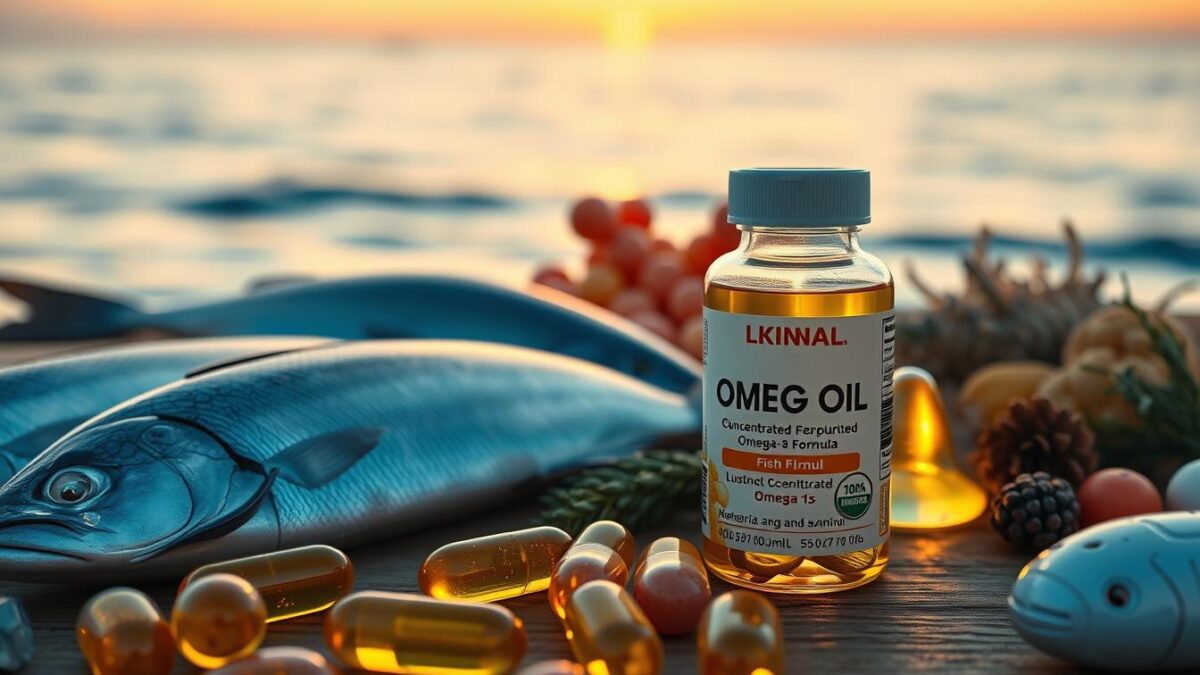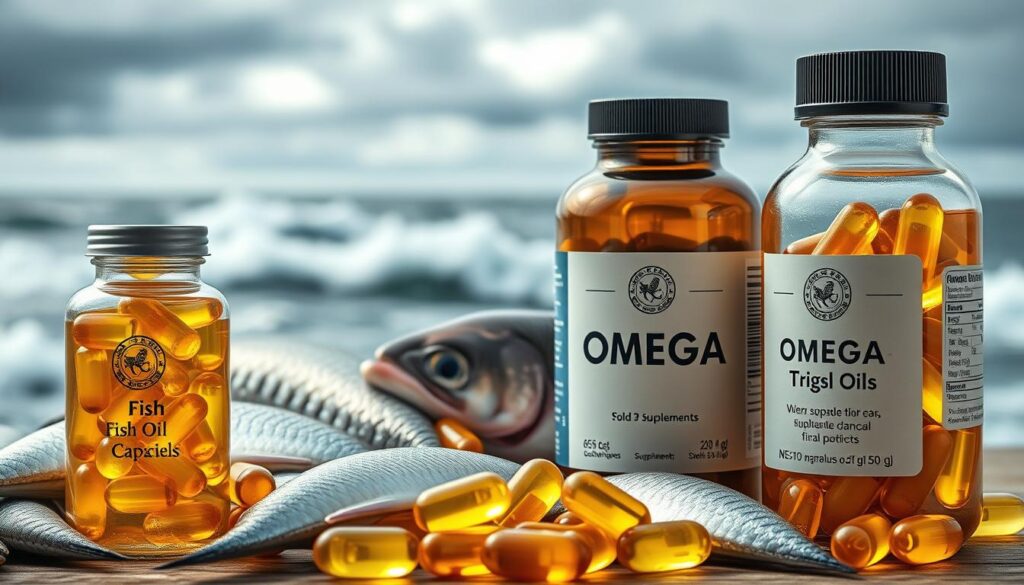
Omega‑3 vs Fish Oil: Which Supplement Suits You?
Are you unsure if you should pick omega-3 or fish oil for your health? You’re not alone. Knowing the difference between these two supplements can help you make better choices for your health. Omega-3 is a group of essential fatty acids, and fish oil is a main source of them. Both offer unique benefits for your health.
In this comparison, we’ll cover the basics. We’ll help you figure out which one fits your health goals best. Let’s get started!
Understanding Omega-3 Fatty Acids
Omega-3 fatty acids are key nutrients that greatly affect our health. They come in three main types: alpha-linolenic acid (ALA), eicosapentaenoic acid (EPA), and docosahexaenoic acid (DHA). ALA is found in plants like flaxseeds and walnuts. EPA and DHA are mainly in fish and marine life.
These acids are important for fighting inflammation and keeping cells healthy. Studies show that eating foods rich in omega-3 can improve heart health and brain function.
To boost your omega-3 intake, add these foods to your diet:
- Fatty fish like salmon and mackerel
- Chia seeds and flaxseeds
- Walnuts
- The oils from these seeds and fish
Knowing where to find omega-3 in your food is a step towards better health. Choosing the right foods can help your overall health and improve specific body functions.
What Is Fish Oil?
Fish oil comes from oily fish like salmon, mackerel, and sardines. These fish are full of omega-3 fatty acids, like EPA and DHA. Many people take fish oil supplements for its health benefits.
It’s available in liquid or capsule form. This makes it easy to get more omega-3s without eating fish every day.
Studies show that fish oil can help your heart and brain. It also boosts overall health. It’s important to know where your fish oil comes from. Look for products made from wild-caught fish for the best nutrition.
Adding fish oil to your diet is simple and healthy. As more people learn about omega-3s, fish oil’s popularity grows. Choosing the right form and source is key to reaching your health goals.
Types of Omega-3 Fatty Acids
Omega-3 fatty acids are key nutrients for your health. There are three main types: ALA, EPA, and DHA. Each type has unique benefits for your body.
ALA (alpha-linolenic acid) is found in plant oils like flaxseed and chia seeds. You need to eat it because your body can’t make it. ALA helps build other omega-3s, but it’s not as effective as EPA and DHA.
EPA (eicosapentaenoic acid) and DHA (docosahexaenoic acid) are in fish and algae. They’re important for heart and brain health. EPA helps fight inflammation and is good for your heart.
DHA is key for brain function and growth. It’s a big part of brain fats, helping with thinking and memory. Getting enough DHA is important for kids’ brains and adults’ memory.
Knowing about ALA, EPA, and DHA helps you choose better foods. This can improve your health overall.
The Health Benefits of Omega-3
Omega-3 fatty acids are key in nutrition because of their health benefits. They help keep the heart healthy and improve brain function. This makes them vital for our overall health.
Cardiovascular Health
Omega-3 fatty acids are good for the heart. They:
- Reduce triglyceride levels
- Lower blood pressure
- Improve artery function
- Decrease inflammation
Research shows that eating omega-3s can lower heart disease risk. Adding omega-3 sources to your diet can boost heart health.
Brain Function and Development
DHA, a type of omega-3, is important for the brain. It supports:
- Neurodevelopment in children
- Cognitive function in adults
- Memory retention and learning
Studies link omega-3s to better brain function, mainly in older adults. Eating foods rich in omega-3s can improve mental clarity and brain health.
Is Omega-3 and Fish Oil the Same?
Many people think omega-3 and fish oil are the same. But they are not. Omega-3 is a group of fatty acids that are good for health. They are found in some foods.
Fish oil, on the other hand, is made from oily fish. It’s a big source of omega-3. This makes it a popular choice for supplements.
Knowing the difference between omega-3 and fish oil helps you make better choices. If you want to boost your nutrition, fish oil supplements are a good option. They’re great for those who don’t eat enough fish.
By understanding these differences, you can pick the right supplements for your health and diet.

Omega-3 vs Fish Oil Comparison
Understanding the sources and types of omega-3 supplements is key. This knowledge helps you pick the right one for your health. Fish oil, a common source, comes in different forms. Each form has its own absorption and effectiveness levels.
Sources and Types of Supplements
Omega-3 fatty acids come from animal and plant sources. Here’s a look at these sources:
| Source | Type | Omega-3 Content | Absorption Rate |
|---|---|---|---|
| Fish Oil | Natural | High | Excellent |
| Algal Oil | Plant-based | Moderate | Good |
| Flaxseed Oil | Plant-based | Low | Moderate |
| Krill Oil | Natural | High | Good |
Absorption and Effectiveness
The way our body absorbs fish oil is important for its effectiveness. Studies show natural fish oil is better absorbed than some processed forms. Better absorption means better health benefits, like heart health and brain function.
This knowledge helps you choose the best omega-3 supplements for your needs.
Recommended Dosages of Omega-3 and Fish Oil
Knowing the right amount of omega-3 is key to getting the most benefits without risks. Doctors say taking 250 to 500 mg of EPA and DHA daily is best. These fatty acids are in fish oil and help your heart, brain, and overall health.
If you can’t eat enough fish, fish oil supplements are a good choice. They help you reach your omega-3 goals. Remember, the right amount depends on your age, gender, and health.
Here’s a brief overview of recommended dosages for different populations:
| Population | Recommended Omega-3 Dosage (mg) |
|---|---|
| Adults | 250-500 |
| Pregnant Women | 300-600 |
| Children | 100-300 |
| Individuals with Heart Disease | 1000 |
Following these health tips can boost your health and avoid risks from too little or too much omega-3. Always talk to a doctor before starting supplements.
Different Forms of Fish Oil and Their Absorption Rates
Choosing the right fish oil supplement is key. There are three main types: natural triglycerides, ethyl esters, and reformed triglycerides. Each type affects how well your body absorbs the omega-3s.
Natural triglycerides are often better absorbed because they match the body’s natural fats. This makes it easier and faster for the body to use the omega-3s. Ethyl esters, on the other hand, are processed to boost omega-3 levels. But, research shows they might not be as easily used by the body as natural triglycerides.
Reformed triglycerides are made by changing ethyl esters back into triglycerides. This process tries to make them more like natural fish oils. While it helps with absorption, it might not be as effective as natural forms.
Here’s a quick comparison of these forms regarding absorption rates:
| Form of Fish Oil | Absorption Rate | Notes |
|---|---|---|
| Natural Triglycerides | High | Best bioavailability, commonly derived from whole fish. |
| Ethyl Esters | Moderate | Processed for concentration, may require higher doses for effect. |
| Reformed Triglycerides | Moderate to High | Designed to improve absorption; effectiveness can vary. |
Knowing how each form is absorbed helps you pick the best fish oil supplement. The right choice can help you get more omega-3s and enjoy better health benefits.
Considering Algal Oil as an Alternative
Algal oil is a top choice for those looking for plant-based omega-3 supplements. It comes from algae and is packed with DHA and EPA, like fish oil. Vegans can easily add vegan omega-3 to their diet with algal oil.
Algal oil is cleaner than fish oil. It doesn’t have mercury or heavy metals, making it safer to eat. It’s also better for the planet because it needs less resources and harms marine life less.
Adding algal oil to your diet can boost heart health and brain function. It’s a great option for those who can’t get omega-3s from fish. Here’s a comparison of algal oil and fish oil:
| Feature | Algal Oil | Fish Oil |
|---|---|---|
| Source | Algae | Fish |
| Vegan-Friendly | Yes | No |
| Contaminants | Free from mercury | May contain mercury |
| Availability of DHA and EPA | Rich in both | Rich in both |
| Environmental Impact | Low resource use | Overfishing concerns |
Choosing algal oil is a step towards a greener lifestyle. It ensures you get omega-3s without harming the planet. It’s a win-win for your health and the environment.
Choosing the Right Supplement for Your Needs
Choosing the right omega-3 supplement is not simple. It depends on your diet, health goals, and taste preferences. First, check your current diet. If you eat fatty fish like salmon or sardines often, you might not need supplements. But if you don’t eat enough, supplements can help a lot.
When looking at options, learn about the best fish oil products. Choose ones that are tested for harmful stuff like heavy metals and PCBs. The quality of omega-3s also depends on where the fish comes from. Wild-caught fish oil is usually better than farmed fish oil. Think about whether you like liquid or capsule supplements. This can help you stick to your routine.
Knowing what you need for your health helps you pick the right supplement. This way, you can find a supplement that fits your life and diet goals. Take your time to explore and compare. Find the best one for you, and you’ll start seeing the benefits soon!



